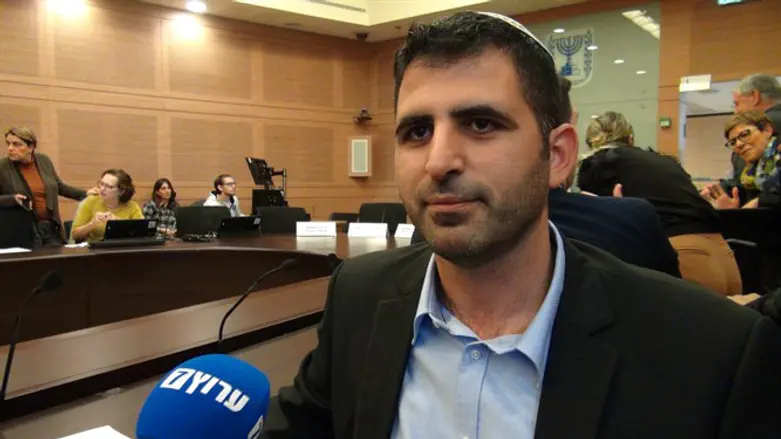
The Israeli government has approved the agreement signed with the Emirates, and later this week the agreement will also be submitted to the Knesset for approval. Is this confirmation nothing more than a rubber stamp? Is there any serious discussion around the various clauses of the agreement? Arutz Sheva discussed this with MK Shlomo Karhi from the Likud.
MK Karhi does not accept the claim that putting the agreement to vote after signing is a meaningless act. "It can be said about raising any issue on which there is a broad consensus, but no," he says. "It's festive, and not really a pros-and-cons discussion. I do not think there are any Knesset members in the Knesset who oppose peace. This is a very big thing when you see the vision of the Prime Minister who brought the 'Abraham Accords', that the children of Abraham are speaking together and promoting prosperity and rejuvenation, and as it is written, 'Peace, peace to the far and the near,' it may be that the method is first to make peace with the far, and only then does the near realize that if he does not get on the train no one will pay any attention to him."
On the question of issues that seemingly deserved in-depth discussion including security and sovereignty issues, Karhi says: "Sovereignty was not rejected because of this agreement. There is no mention in the agreement of applying sovereignty or non-application of sovereignty. We have a great friend in the U.S. He set the tone for the peace plan and asked to wait with it. Hopefully he will win the election and we will have more significant legitimacy for the application of sovereignty. It has only been postponed and this matter will come to pass.
"There's no other option. The sleepwalking Left also understands that the settlements will remain intact and Israeli law will be applied to them. It is only a matter of timing. The Prime Minister can be trusted to lead the line in favor of Israel's security," says Karhi. With the Palestinians in order to reach a fair solution that is in line with the needs of the two peoples, are these not hints at advancing the vision of two states and establishing a Palestinian state? Karhi responds: "We oppose a Palestinian state. A fair solution for us is what will allow autonomy as it is called today. We do not want to have civilian control over the residents of the PA, we want them to take care of their problems, we do not need them to be citizens of Israel."
Karhi adds: "Military and security control also according to the far-reaching Trump plan that we did not agree on but only as a basis for negotiations, according to which all security and air control is in Israel's hands and only civilian control, which is in their hands even today. There is no one today who cares about apartheid or the expulsion of anyone. We do not want to do that but to live in peace while spanning the west of the Jordan there is one state and that is the State of Israel, and they live in civil independence and lead their civilian lives only."
As for the security issue, when the American aircraft deal repeatedly arises in this context, does this issue not justify a more in-depth discussion of the terms of the agreement? "Everyone knows that Israel opposes granting security supremacy to countries in the Middle East, including in this matter. But it is the United States that makes the decisions. They are the ones involved in the expected deal. The prime minister has expressed his opposition and we can only hope that in every outline Israel's edge over the neighboring countries will be preserved."
Would this statement by Karhi not have been heard more sharply if Karhi had now been a member of the opposition? "I very much hope that this will happen and that eventually the President of the United States will accept Israel's demand. Of course you can be more aggressive in your statements, but you have to remember that there is a great friend of Israel here who has most of his policies and actions in favor of Israel. There are also security considerations that we are not familiar with. I assume that if this is a deal that will significantly threaten Israel's security, our statement will be sharper and clearer and the demand will be more assertive. As long as this does not happen and there is little harm, and since the United States isn't asking us, I see no reason to quarrel decisively when we aren't party to the matter. It is important that every deal you sign will preserve Israel's security superiority. This is also the president's position."
On rumors surrounding a special status that the Emirates will have on the Temple Mount, MK Karhi says he does not recognize such a special status and in his opinion it is nothing more than allowing tourists from the Emirates to visit the Mount complex as permitted to any tourist from any other country around the world.
His position on ratifying the agreement, which is expected to receive a very large majority in the Knesset vote on Thursday: "This is a festive event. We see Netanyahu's vision leading to peace for its own sake, peace from common economic interests. We saw the Palestinian missiles fired at the signing. They were trying to tell us that they are strong in destruction and do not seek peace and the whole world saw this and the legitimacy that the PA and Hamas are receiving in some European countries is declining. The Palestinians no longer have a veto over peace. We're not asking the Palestinians, and even without them, a new and peace-loving Middle East will arise here."
